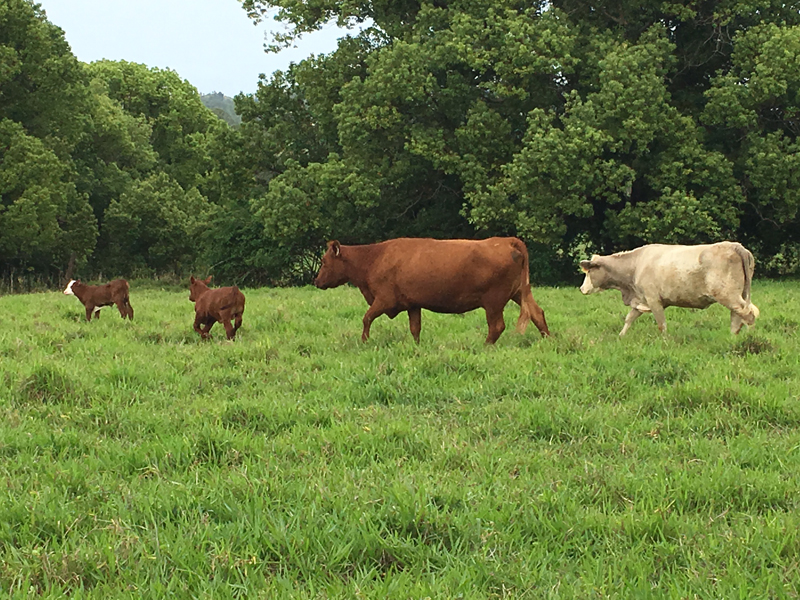Some animals cannot withstand ticks and fly. Once upon a time I believed that with correct nutrition animals would be able to repel parasites. While I still think nutrition is vital I have also come to the conclusion that there are always some animals more susceptible than others to parasites.
The ‘normal’, accepted and supposedly kind approach is to treat with drenches, pour-ons and injectibles. These chemicals do indeed get rid of the ticks and fly (and worms and fluke) and definitely make affected animals more comfortable. But what is the result of this approach? Animals with no natural resistance. Animals that will continue to need cyclical chemical inputs and the associated cost and impact of those inputs. That’s great for the Agribusinesses that patent and sell the silver bullet solutions but I’m pretty sure its bad for the animals, the environment, the primary producer and the consumer.
We are lucky to work with a lot of organic producers and what we’ve noticed is that many issues are relevant across farming enterprises. I had a really interesting conversation with Dave a local certified organic bean grower (Biofields Organics) and we talked about resilience. With his decades of experience growing he has observed that plants that have to work to find their nutrition plus work to resist insects, diseases etc become more robust AND they taste better and last longer once picked. Did you know that the nutrient value of our food has declined since the increase in chemical/synthetic driven agriculture?^Did you know that the value of agribusiness production has shifted away from income to the primary producer to income captured by agribusinesses that make and sell inputs?*
When we nurse plants through that wouldn’t survive left to their own devices we are in effect reversing the Darwin principal (survival of the fittest). The the more we jump in with solutions (coming from the best of intentions) the less we give our livestock the opportunity to build resilience. The more we jump in the less likely are we to observe what nature’s plan is. The more we jump in the more likely we will need to keep jumping in.
Am I saying just do nothing, no. It’s a fine line. Think of the old saying – you can lead a horse to water but you can’t make it drink. Your job is to create the right conditions for your animals/plants but you can’t do the drinking for them. Chemicals and synthetics however force the ‘horse’ to drink. And, the more we force the drinking the more likely the ‘horse’ will forget/lose the ability to drink themselves.
So how can you be proactive and what do you do? You need to give your animals the best nutrition and conditions possible and keep examining and adjusting your management. Your goal is thriving, healthy, resilient animals. Keep chemicals as the absolute last resort and/or if all your changes don’t make an impact then consider moving badly affected animals on. Perhaps they will never respond because they are just unable to. View the use of chemicals as a failure not a tool- that will put the pressure on you to change the way you address issues as they arise.
What are some of the things you can do?
- A soil and or leaf test – what minerals are you missing (which means your animals are missing them too) – supplement those minerals knowing that via dung you’re also getting those minerals into the soil
- observe what weeds are growing and notice whether your animals are eating them – maybe some clues to minerals missing and needed
- invest your money in education rather than band aids- holistic management training, natural sequence farming, low stress stock handling, animal nutrition
- find non chemical support mechanisms that assist animals rather than doing the job for them (Bos Bag for fly control, topical spray like vinegar for ticks, copper sulphate for worming)
- rotation rotation rotation – breaks parasite cycles AND gives pasture recovery time
- abundant natural grasses from natural pasture is your goal. It comes from living, healthy soil. Focus on soil and you’re on your way.
- don’t breed from animals that are heavily affected by parasites
- look for idiosyncrasies and messages from nature – sometimes nature is trying to solve problems for you but you just haven’t realised it.
- fertility is linked to resilience – females with lower resilience are always the ones that will struggle to get in calf/lamb/foal etc
- while the general rule that Bos Indicus animals are more resistant than Bos Taurus animals, there’s as much variation within breeds as there is between breeds – don’t get rid of all your Bos Taurus animals in the belief that will solve your parasite issues. We don’t subscribe to one breed as we love the diversity that multi breed incorporation has brought us.
One last point -the standard response to our choice to select for parasite resistance is that parasite resistant animals are tougher which means they have tougher meat and therefore are not good to eat. Having our own Beef Brand K2Beef we know that this notion is false. We are 100% sure that meat tenderness comes from animals that are not stressed. Everything we do to minimise stress in all parts of our animals life cycle while fostering the increase of their natural resistance will result in healthier, tastier meat. Reducing stress in livestock is something we can do something about and it happens everyday when we handle our animals and in the conditions we create for them.
^https://www.ajfand.net/Volume19/No3/Kidane15825.pdf | file:///C:/Users/BOS/Downloads/sustainability-10-03218.pdf | https://www.researchgate.net/publication/237436311_Declining_Fruit_and_Vegetable_Nutrient_Composition_What_Is_the_Evidence
*http://www.agriculture.gov.au/abares/research-topics/productivity/agricultural-productivity-estimates
